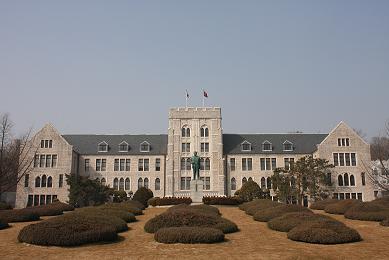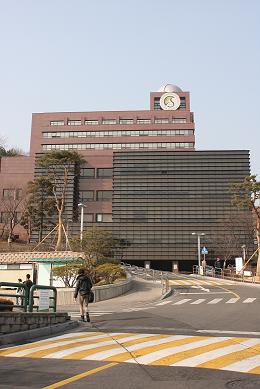Private Universities' demands for autonomy and deregulation
THE CURRENT educational policy of Korea is represented by the so-called “Three-No's” – no individual university entrance exams, no high school ranking system, no admissions for donations. As the name “Three-No’s” implies, there was quite a high degree of government intervention during the Roh administration. Following Pres. Lee Myung-bak’s inauguration last year, private educational institutions, which account for over 87% of higher education in Korea, started their move to escape from various government regulations and to gain “autonomy." While the abolition of the “Three-No’s” was widely covered by the media, the schools’ push for relaxation and eventual abolition of the private school law was not. A severe set of conflicts is expected in Korean society as private schools push for the controversial private school law revision.
The current private school law and movements for revision
The current private school law stipulates that an outside director recommended by parents and teachers must sit on a private school's board of directors. When a director’s office is terminated, a new director should be appointed according to the rules of this law. If the university does not abide by the rules, the new director is not acknowledged by the government. Another requirement is the formation of councils composed of students and school employees. They participate in the appointment of directors, rather than directly exerting influence over the board. According to the current law, the only university member who can directly influence the board is the president, who can become a director.
The Korean Council for University Education (KCUE) created a committee on private law reforms and showed a strong will to revise the current law. However, Cheon Kwang-seok (Prof., Dept. of Law) says, “We have yet to see whether the KCUE will become a truly autonomous organization of universities or merely a tool of government intervention by which the ministry can exert indirect influence over universities.” Although the decentralization of power from the ministry to other organizations like the KCUE is a necessary process in order to escape standardized administration by the government, a means of regulation should be arranged in order to prevent freedom from becoming chaos.
*Board of directors
A body of appointed people who jointly oversee the activities of the university. Typical duties of the board include (1) Governing the organization by establishing broad policies and objectives (2) Selecting, appointing, supporting, and reviewing the performance of the president (3) Ensuring the availability of adequate financial resources.
**KCUE
An organization that discusses and conducts research on university education and finance in order to develop cooperation among universities and improvement of government policies. There are 198 member universities, and Sohn Byung-doo (Pres., Sogang Univ.) became the 14th president in April 2008. Tasks related to university admission procedures were transferred from the ministry to the KCUE.
The controversy over the drive for the private law revision
The University Foundation – an organization formed around the founder and based on the property endowed for the establishment of a university – has the right to decide the basic framework of corporate finance, facilities, and personnel management. The founders exert influence over the university through the board, which makes important decisions of the school, such as deciding the next president. However, if the founders and their relatives dominate the university board, the property endowed for the foundation in the first place is likely to be used for purposes other than research and education.
In order to prohibit such abuses, the private school law was revised by the Uri Party in 2005 to include clauses that compel schools to form more transparent boards by including outside directors and publicizing their proceedings. This law has been fiercely opposed not only by universities with a board that has a strong sense of ownership of the school but also by universities that had been appointing outside directors as board members. Jung Byung-soo (Director, Board Business Office) says, “The current law forcing the inclusion of outside directors in a school board violates a school’s spirit.” He also adds that Yonsei, Korea, Sungkyunkwan, and Ewha Woman’s Univ. – which have been voluntarily implementing this system of appointing outside directors for years – are now unable to abide by the law due to the irrational uniformity of appointments that the private school law stipulates. Such a law ignores each school’s own history, vision, strategy, and the different amount of human resources it can mobilize for effective governance.
The right time for change?
More autonomy and the deregulation of universities have been discussed for years, and the general public is aware that past educational policies based on the authoritarian and bureaucratic administration of the Ministry hampers the progress of Korean education. However, some believe that it is too early to revise the private school law before its proper implementation. Kim Myung-shin (Co-president, Citizen Movement for Educational Reformation) says, “Although some universities are making voluntary efforts to keep the governance system transparent and democratic, many others are not. Considering such reality, I believe that it is too early to consider the exclusion of outside directors.”
Furthermore, it is questionable whether Korean universities have the capability to self-rule. Hwang Keum-Joong (Prof., Dept. of Education) says, “Considering Korea Univ.’s recent application of the high school ranking system, I am highly doubtful of the universities’ capability and willingness to self-govern.” Part of the reasons for universities seeking more autonomy is to diversify the criteria of evaluating and selecting students. Hwang says, however, that the decision to admit students based on their high schools is based on the simple thought that students from special-purpose high schools have better academic and language skills. In this case, the government’s deregulation simplified the criteria rather than diversifying it.
A desirable autonomy based on responsibility
Excessive government regulation can be an obstacle to the universities’ development considering that it discourages people’s willingness to change the governance and educational system. Yet, as long as Korean universities aspire to become a sort of Ivy League that is highly esteemed by society, they should prioritize their responsibilities before seeking profits.
Private universities should recognize their identity as educational institutions that receive subsidies and tax reductions from the government. They are receiving governmental support based on the assumption that they serve the public interest. According to Jung, Yonsei Univ. is also receiving substantial financial support from the government. The government subsidizes part of the educational costs, and no tax is imposed on real estate being used for educational purposes – for example, Yonsei Univ.’s Shinchon Campus and Deokso Farm. There are also tax reductions for property used for gaining returns, such as the real estate possessed by Yonsei Milk Corporation. Jung adds, “Yonsei Univ. appreciates the government’s tax credits and the subsidies it is enjoying right now. Although there are some regulations in the sale and purchase of real estate possessed by private universities, I personally believe that it is a reasonable restriction for maintaining universities’ identity as nonprofit and socially responsible organizations.”
Moreover, neither the founders nor the members of the university should be excluded from the decision-making process of universities to ensure transparent university governance. Comprehensive matters like finances and the management of facilities should be handled by the university foundation or the board, but particular matters like course administration or appointment of faculty should be managed by the members of the university, such as professors, students, and other staff members. Indeed, a framework designed to collect opinions of the members of the university should be institutionalized before entrusting the board with finances and overall management of the university. According to Cheon, however, there is no such framework in universities, and the board of directors still exerts a lot of influence on the decisions over particular matters in a lot of cases. A balance of power should be achieved among students, faculty, and the board in order to prevent the autonomy of universities from degenerating into autocracy or even plutocracy.
* * *
Universities these days have become a standard for evaluating national competence in the contemporary information-based society. A greater degree of university autonomy is essential for Korean universities to become globally competitive. However, it is also important to remain aware of the social responsibility that always accompanies freedom. The universities’ demand for autonomy and deregulation is a complicated matter involving various entities, such as the MEST, KCUE, board of directors, and other members of the university. Various interests are already clashing as another great change in educational policy is about to take place. At this critical point, it is important that universities are not blinded by the short-term benefits of deregulation but have a long-term vision as educational institutions that aim to produce globally competent students.
Different names for “the board”
Korean university boards are referred to as the “board of directors”, just as people refer to the boards of profit-making corporations. However, in the U.S., university boards are called the “board of trustees”, differentiating them from the boards of profit-making companies. The name “board of trustees” emphasizes that the people composing the board have the responsibility of managing the properties that have been entrusted to them rather than exercising ownership of them. – Yoon Se-joon (Prof., Dept. of Business & Council of Professors, Chairman of the Research Committee for the Development of University Foundation
University autonomy in the Constitution
Constitutional Law guarantees universities autonomy. Article 22 assures learning and intellectual rights, and Clause 4 of Article 31 stipulates that “Independence, professionalism, and political impartiality of education and the autonomy of institutions of higher learning are guaranteed under the conditions prescribed by law.” This prohibits the government from intervening in education for political purposes or other purposes that run counter to the values pursued by education or research. On the other hand, the government has the responsibility of forming an ideal environment for the realization of educational values. In order to form the ideal circumstances for education, the government provides schools with financial and administrative support. Behind the arguments for and against the private school law revision, there is a fundamental conflict between two important values: political impartiality of education and government responsibility to educate.
|
|
|
|
|
| ||
|
| Korea Univ. |
|
|
| ||
|
|
|
|
|
| ||
|
| Sungkyunkwan Univ. |
|
|
| ||



